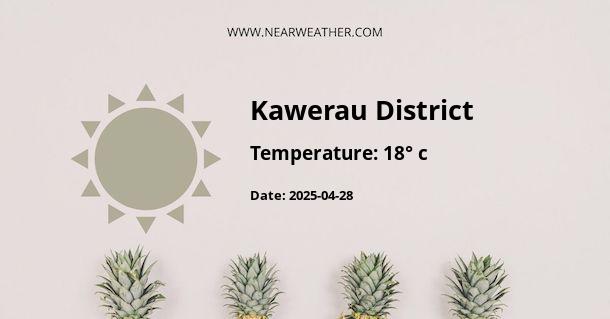Kawerau District, New Zealand: Climate and Weather Year Round
Kawerau District is a beautiful region located in the Bay of Plenty on the North Island of New Zealand. Known for its stunning natural landscapes and rich Maori culture, Kawerau District experiences a unique climate and weather patterns throughout the year. In this article, we will explore the different seasons, temperatures, precipitation, and other climatic factors that shape the weather in Kawerau District.
Seasonal Overview
Like the rest of New Zealand, Kawerau District experiences four distinct seasons: summer, autumn, winter, and spring. Each season brings its own characteristics and weather patterns.
| Season | Temperature Range | Precipitation |
|---|---|---|
| Summer (December - February) | 20°C - 30°C | High rainfall |
| Autumn (March - May) | 15°C - 25°C | Moderate rainfall |
| Winter (June - August) | 5°C - 15°C | Low rainfall |
| Spring (September - November) | 10°C - 20°C | Moderate rainfall |
As seen in the table above, summer is the warmest season in Kawerau District, with temperatures ranging from 20°C to 30°C. This is the peak tourist season, as visitors flock to enjoy the pleasant weather and explore the natural wonders of the region. However, summer also brings high rainfall, so it is important to pack appropriate rain gear when visiting during this time.
Autumn follows summer, with temperatures ranging from 15°C to 25°C. The rainfall during autumn is moderate, creating a pleasant and comfortable atmosphere for outdoor activities. The changing colors of the trees during this season make the region even more picturesque.
Winter in Kawerau District is relatively mild compared to other parts of the country, with temperatures ranging from 5°C to 15°C. The rainfall during winter is significantly lower, allowing visitors to enjoy the crisp air and explore the stunning landscapes without much interruption.
Spring marks the transition from winter to summer, with temperatures ranging from 10°C to 20°C. Like autumn, spring experiences moderate rainfall, which helps to rejuvenate the flora and fauna of the region.
Monthly Averages
Let's take a closer look at the monthly averages for temperature and precipitation in Kawerau District:
Temperature:
| Month | Average High (°C) | Average Low (°C) |
|---|---|---|
| January | 25 | 15 |
| February | 24 | 15 |
| March | 23 | 13 |
| April | 20 | 10 |
| May | 17 | 7 |
| June | 14 | 5 |
| July | 14 | 4 |
| August | 15 | 5 |
| September | 17 | 7 |
| October | 19 | 9 |
| November | 21 | 11 |
| December | 23 | 13 |
As shown in the table, the temperatures in Kawerau District vary throughout the year. The summer months of January and February are the warmest, with average highs of 25°C and 24°C, respectively. On the other hand, the winter months of June, July, and August are the coolest, with average highs of 14°C. It's worth noting that the temperature difference between the highest and lowest months is relatively moderate, making the region comfortable to visit year-round.
Precipitation:
| Month | Precipitation (mm) |
|---|---|
| January | 150 |
| February | 130 |
| March | 130 |
| April | 110 |
| May | 100 |
| June | 100 |
| July | 100 |
| August | 100 |
| September | 100 |
| October | 110 |
| November | 120 |
| December | 140 |
Kawerau District receives a relatively high amount of rainfall throughout the year. The summer months of January, February, and December experience the highest precipitation, with an average of 150mm, 130mm, and 140mm respectively. The winter months of June, July, and August receive the lowest amount of rainfall, with an average of 100mm.
Microclimates and Influencing Factors
Despite being a relatively small region, Kawerau District exhibits microclimates due to its diverse topography and geographical features. The presence of mountains, forests, and the nearby coast contribute to variations in temperature and rainfall across different areas.
The coastal areas of Kawerau District tend to have milder temperatures compared to inland areas. The proximity to the ocean moderates the temperature fluctuations, resulting in cooler summers and milder winters.
The mountains and forests in the region also impact the microclimates. They act as natural barriers, influencing wind patterns and creating variations in rainfall. The mountains often receive more precipitation, while the sheltered valleys may experience less rainfall.
Conclusion
Kawerau District in New Zealand offers a diverse and unique climate throughout the year. From the warm and rainy summers to the mild and relatively dry winters, each season presents its own charm and opportunities for outdoor exploration. Whether you visit during the lively summer or the tranquil winter, Kawerau District is sure to captivate you with its natural beauty and vibrant Maori culture.
A - Kawerau District's Latitude is -38.099998 & Longitude is 176.716675.
A - Weather in Kawerau District is 11° today.
A - Climate Conditions in Kawerau District shows overcast clouds today.
A - Humidity in Kawerau District is 68% today.
A - Wind speed in Kawerau District is 0.54 km/h, flowing at 278° wind direction. today.
